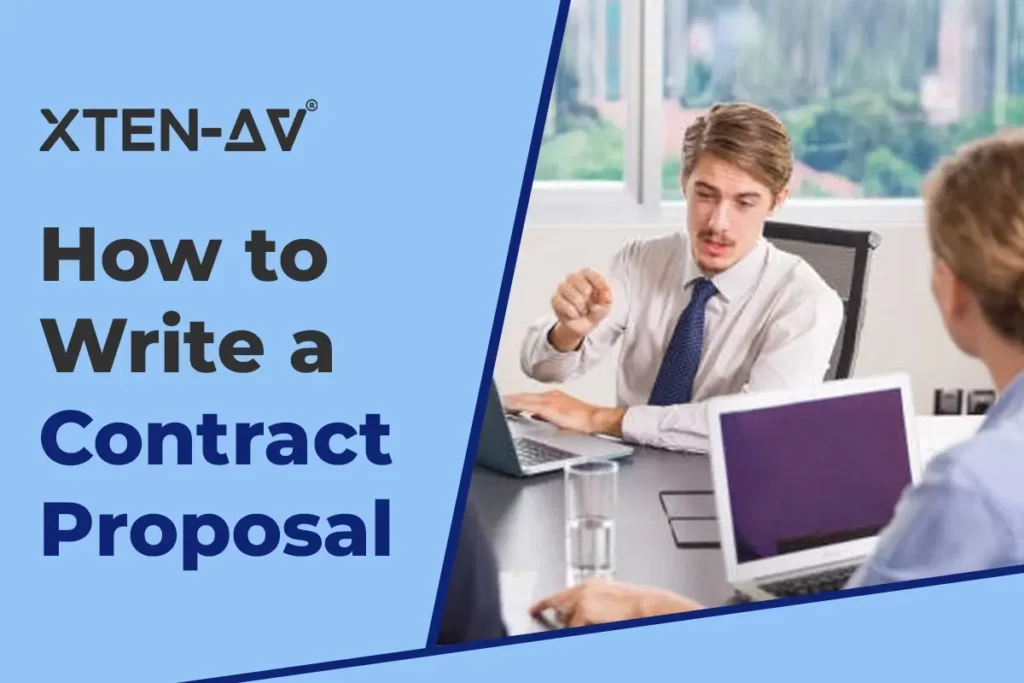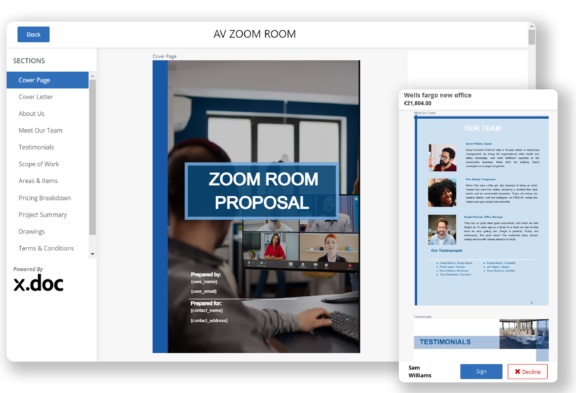Contract Proposal - How To Write, Esential Components and Importance
A contract is a precious part of every business. The right contract helps you save time and money. It covers all the legal details of your deal and outlines the terms and conditions. A well-written contract proposal cuts any future headaches. By solving things early, the entire contract lifecycle can improve. If you are new to writing contract proposals, that will be a challenging task. A well-crafted contract proposal enhances the information and gives you more chances to impress your client. Also, you can check the free online templates of contract proposals, which help to get the deal faster.
The all-in-one solution for your AV needs
Transform your audio-visual experience with XTEN-AV.
No Credit Card required
Key Takeaways:
- Contracts are an imperative part of every business. With this, the work will be easier for both parties.
- Learn the steps of how to write a contract proposal.
- Elements define the presentation, which explains your whole proposal’s vital details.
- Explore the free contract proposal template by XTEN-AV and boost your work to get the deals 10X faster.
How to write a contract proposal?
When you start your contract proposal, focus on the client’s perspective. Make your information attractive and clearly explain what your business does. Highlight your strengths and achievements to grab their attention. Emphasize key points that can help you secure the deal quickly, as mistakes can hurt your chances. Templates will have you provide the good steps where you just need to fill in the information. A well-structured proposal will help you get more deals and save precious time.
After structuring your business proposal effectively, you can develop a reusable template. Elements such as names, addresses, and past experiences frequently stay the same and can be included in future proposals. This method saves time and maintains consistency in your contract proposals. Check the steps below to help you get more deals.
Introduction
In the starting of your proposal with a brief introduction that clearly outlines what the proposal covers and the key benefits of the agreement. Create a professional and confident tone or the rest of the document.
Scope of Work:
Explain the needs and deliverables are outlined in the agreement. Include the time schedule, milestones, and deadlines to ensure everyone is on the same understanding of what is finished and when.
Payment Terms:
Well mentioned the cost of the deal and the payment schedule. The information is, wire transfer, credit card, or cheque, and any late fees or penalties.
Duration of Agreement:
Provide the start and ending dates in the agreement. If applicable, include any provisions for renewing or extending the contract.
Termination Clause:
The agreement can be ended if certain things happen, like breaking the contract rules or not doing the agreed work. The notice periods needed before ending the agreement should also be included, which means how much advance warning must be given to the other party before the termination.
Intellectual Property Rights:
When creating intellectual property, it’s important to clearly define who owns it, who can use it, and under what conditions it can be used.
Confidentiality and Non-Disclosure:
When sharing sensitive information, it’s essential to clearly define what is confidential, the requirements for maintaining confidentiality, and any exceptions.
Indemnification:
Define the responsibilities of each party in case of a legal claim or dispute, including who will cover damages, legal fees, or other costs.
Governing Law and Jurisdiction:
State which laws apply to the agreement and which courts will handle any disputes.
Handwritten or Electronic Signatures:
A section should be for both parties to sign, indicating their agreement to the terms. Provide spaces for the date and each party’s printed name and title.
Essential Elements of Contract Proposal
A good pointer will always enhance the details of your contract proposal. Avoiding mistakes and sending the perfect information helps lock the deals. Here are the key elements you need to include in a contract proposal when sending it to a potential client:
- Introduce Yourself: Start by saying who you are and what your business does. Mention anything that makes your company appealing to the client.
- State the Problem: Explain the issue you plan to solve for the client. Keep it brief, but show that you understand their needs and have done your homework.
- Present the Solution: Explain how you will solve the problem. Be concise, especially if you’ve already talked about this with the client. Use this part to justify your fees and show why you’re the best choice.
- Detail the Compensation: List your fees and any important payment terms. Also, explain how either side can end the contract.
Importance of writing a contract proposal
A well-created contract proposal always attracts prospective clients. It is a powerful tool for pitching your ideas and plans in a way that appeals to potential clients or businesses.
If you understand clients’ needs, your task becomes easy. Based on their requirements, you can create the proposal and include all the information they expect. This knowledge helps you make an offer that’s beneficial to both parties.
Why is a contract proposal more effective than a contract?
A contract proposal is more effective than a contract because it serves as a detailed plan and pitch to win a client’s business. It outlines what you will do, how much it will cost, and the benefits for the client, helping to convince them to agree before finalizing a legally binding contract.
It saves a lot of time and effort during negotiations. Your proposal already outlines the rights, responsibilities, and rules, serving as a rough framework for the actual contract.
- Only convince clients to purchase their products and services.
- It covers both parties agreeing on what the project will include.
- Your Businesses and professionals can manage the risks and decrease the client’s confusion.
To do so:
- Think about how you structure your proposal.
- Break up the text to make it easy to read; your trusted client will not need to search for the essential facts.
- Remember, a contract proposal is not the final document.
Its contents are flexible and can be adjusted until both parties reach an agreement.
Which is the perfect proposal creation & tracking software for your contract proposal?
A perfect proposal management software provides you with a lot of advanced features. You can add texts, logos, color changes, font sizes, and more. If you want to enhance the version of your proposal to look more professional, choose a software version that provides you with an e-signature option. Online signatures are also helpful for your work; they save you time and money. It sounds overly advanced if I say your software can send you a notification. Some software provides real-time updates whenever your proposal is viewed, accepted, needs changes, or is rejected. It simply provides a reminder to the client, which is very helpful and reduces the extra effort.
In this case, XTEN-AV is for you. It has all the extraordinary features. In a contract proposal, you can take advantage of these advantages, impress your clients, and lock your deals. With XTEN-AV, you can win your deal 10X faster.
100+ Free Proposal Templates
- Create Winning Proposals
- 10x Your Closing Rate
- Efficient Document Tracking
- Legally Binding Digital Signatures
- Best Editing & Styling Features
Free contract proposal template by XTEN-AV
Contract proposal templates make your work easy and fast. You need to put your company’s vital details there. Each section has its specification facility; you need to fill it out. Also, you can change the text, fonts, images, lines, and sections according to your desire. With such amazing facilities, XTEN-AV will provide a free contract proposal template that suits your business. Your proposal looks professional with XTEN-AV’s free template. Book a demo session with XTEN-AV.
Conclusion
Creating a well-written contract proposal is essential for any business. It can save you hours and money and ensure all legal issues and words are understood, avoiding future complications.
If you understand the client’s needs, you have a plus point to consider according to the client. Some opponents are doing better than others, but mistakes can decrease the value of your business and proposal. The successful proposal includes an introduction, scope of work, payment conditions, length, termination provisions, intellectual property rights, confidentiality, indemnification, governing law, and signatures. With the correct information, you can win the contract smoothly.
Advanced tools such as XTEN-AV can improve your proposals, making them more professional and efficient. The free templates, e-signature features, and real-time updates can help your company close agreements faster and more efficiently, providing a competitive advantage.
FAQ
Common Mistakes to Avoid in a Contract Proposal:
- Vague Terms: Be specific to avoid misunderstandings.
- Missing Details: Include all necessary information.
- Overpromising: Only promise what you can deliver.
- Ignoring the Client’s Needs: Focus on the client’s requirements rather than what you offer.
- Poor Formatting: Ensure its well-organized and professional.
Yes, online contract proposals are legal and valid as long as they meet the necessary legal requirements. Here are the key points that make an online contract proposal legally binding:
- Mutual Agreement: Both parties must agree to the terms outlined in the proposal. This agreement can be shown through actions such as signing the document or explicitly accepting the terms via email or an online platform.
- Electronic Signatures: Many jurisdictions recognize electronic signatures as legally binding. This means that if both parties sign the contract proposal electronically, it holds the same weight as a physical signature. Various tools and platforms provide secure electronic signature services to ensure authenticity and security.
- Clear Terms and Conditions: The proposal must clearly outline the terms and conditions of the agreement, including the scope of work, payment terms, and any other critical details. This clarity helps prevent misunderstandings and disputes later on.
As long as these requirements are met, an online contract proposal is just as legal and valid as a traditional paper contract.
Significant valuable content for contract proposals. The points below will take care of your proposal details.
- Introduction: Overview of the proposal.
- Scope of Work: thoroughly explained description of tasks and deliverables.
- Timeline: Schedule for completion.
- Cost: Pricing and payment terms.
- Terms and Conditions: Legal aspects, including responsibilities and rights.
- Conclusion: Summary and next steps.
Scope of work: this section outlines what will be done, how, and by whom. It sets clear expectations and is crucial for preventing disputes.
- Detailed Description: The Scope of Work outlines exactly what tasks and activities will be performed. It breaks down the project into specific steps, providing a clear roadmap of what needs to be done.
- Responsibilities: It specifies who is responsible for each task. This includes not just the service provider but also any responsibilities that fall on the client.
- Methods and Processes: This section describes how the tasks will be accomplished. It might include methodologies, tools, or specific approaches that will be used.
- Timeline: It provides a schedule for when tasks will be completed. This timeline includes start and end dates, as well as any key milestones.
This shared understanding is essential for successful project execution and for preventing disputes and misunderstandings.


